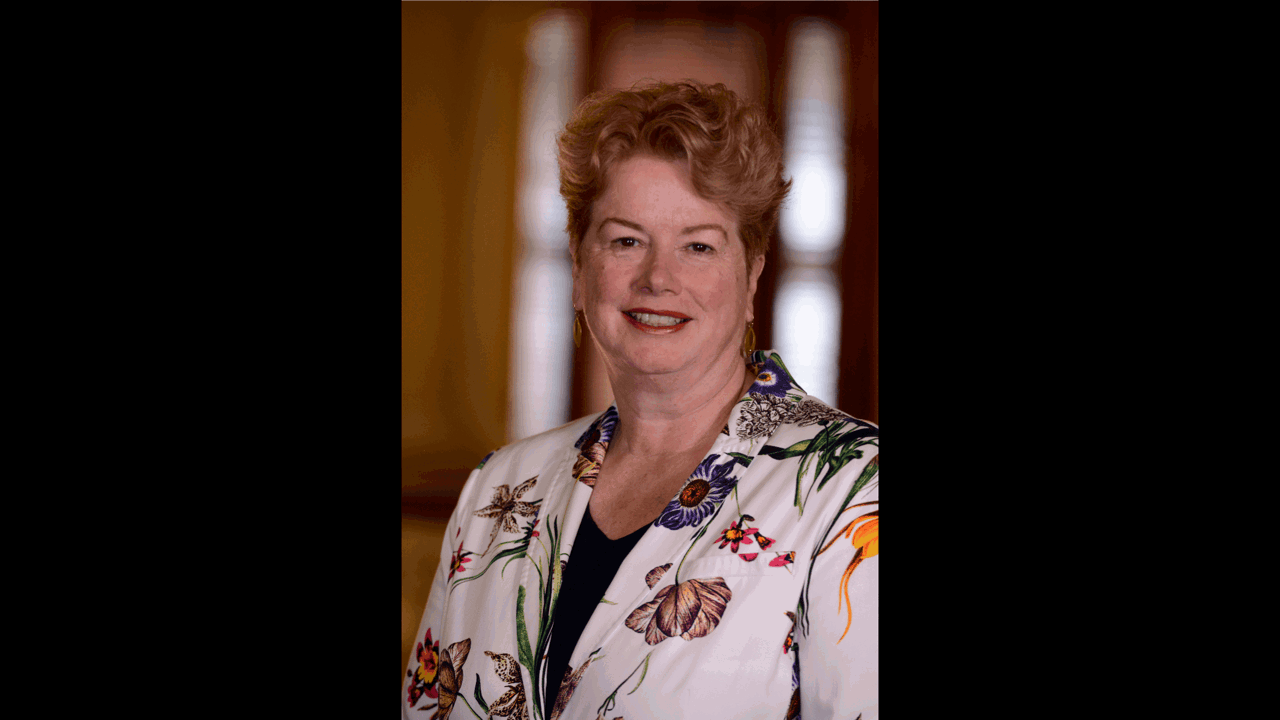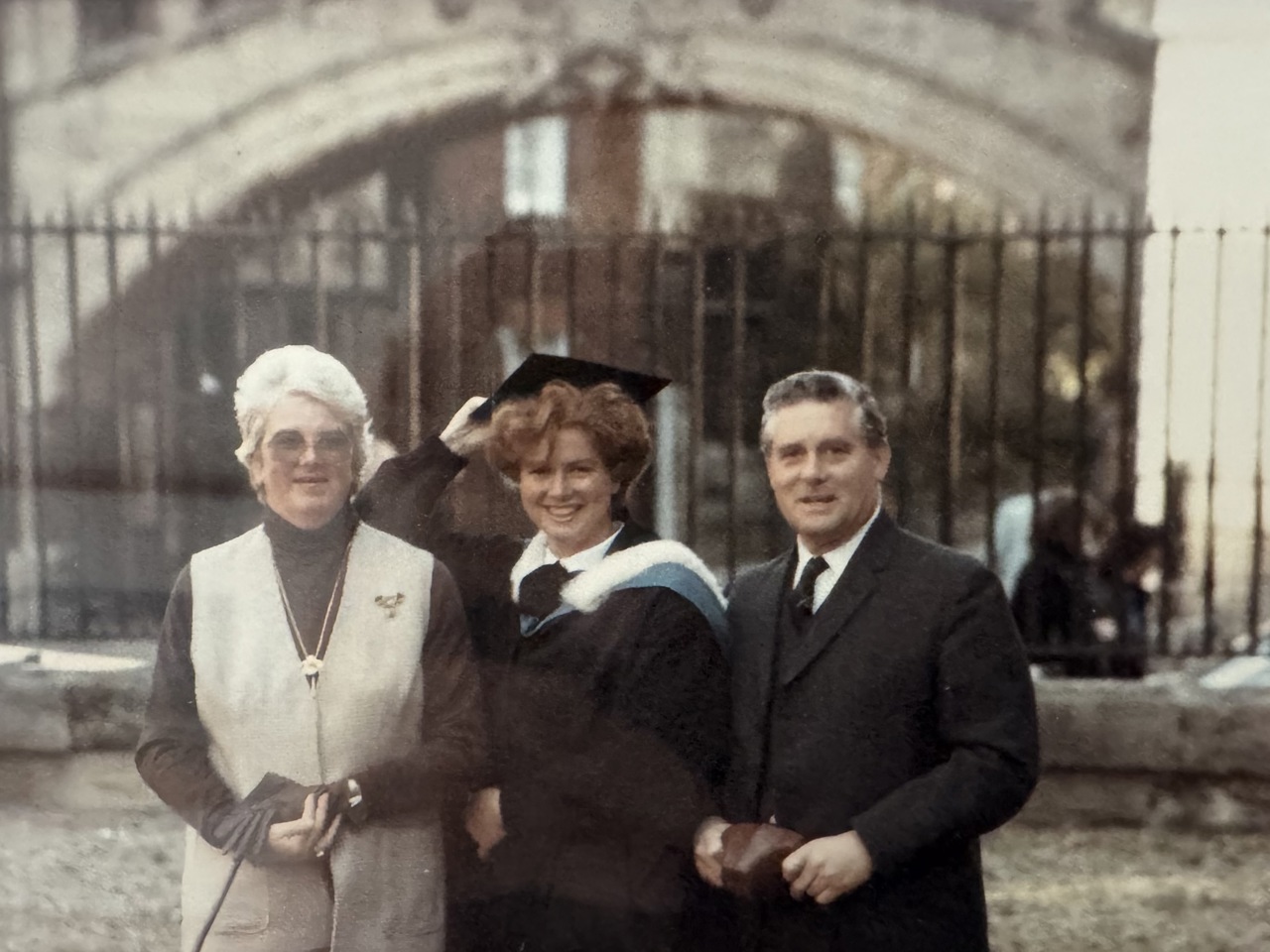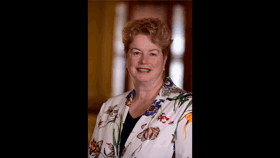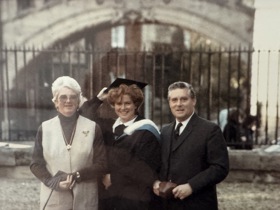Born in the early 1960s in England, Elizabeth Hollingworth moved with her family to Australia as a child. She studied at the University of Western Australia before going to Oxford to read for the BCL. Hollingworth was the first Australian woman lawyer to be awarded a Rhodes Scholarship. After Oxford, she returned to Australia and, having completed her articles of clerkship, worked as a litigation solicitor before joining the Victorian Bar in 1991. Hollingworth was appointed senior counsel in 2002 and a judge of the Supreme Court of Victoria in 2004. Alongside her work as a judge, she taught legal practitioners and students and she has been active across a range of legal and law-related organisations, including the External Advisory Council of the Law School at the University of Melbourne and the International Commission of Jurists. Hollingworth is also an Honorary Fellow of St Edmund Hall, Oxford. This narrative is excerpted from an interview with the Rhodes Trust on 10 September 2024.
Elizabeth Hollingworth
Western Australia & St Edmund Hall 1984




‘I had the best of both worlds’
I’m one of four kids and we spent our early childhood in England before my parents moved out to Australia in the late 1960s. It was a time when Australia was really encouraging migration, from Britain in particular, and Australia seemed like a land of opportunity. My father was a doctor and my mother had trained as a teacher, and it was just assumed, indeed expected, that all the kids would finish school, go to university and do something. We all played sport – especially water polo and swimming – and I think my parents spent most of their mornings and evenings and weekends driving us to something or other. My sisters and I were encouraged to achieve fully, even though my parents were of a generation where they would have never dreamed of going to, say, a female doctor. So, although I was very lucky to be supported fully, it came from a place of slightly mixed messaging.
I grew up in Canberra and went to local state schools for primary. Then, I went to the local girls’ private school for four years before my parents sent me to board at Geelong Grammar in Melbourne. That meant I had the best of both worlds. Being at a girls’ school was a good training in learning that I could do and be anything I wanted. All the role models in the school were women, and by the time I got to the co-ed school, I didn’t care whether the boys were worried about whether I came top of the maths class, and I felt fully entitled to use of the rowing boat or the swimming pool!
On applying for the Rhodes Scholarship
For many years, I was sure I was going to do medicine. Then, sometime around my last few years of high school, I had a mini-rebellion. I say mini-rebellion, because switching to law is hardly a rebellion. I’d always been interested in debating and arguing, and I’d also watched a lot of Perry Mason, which was a totally unrealistic view of what law as, but it inspired me to pursue law.
I was lucky at the University of Western Australia (UWA) because my class was relatively small and I got a real sense of belonging to a group. It was a terrific law school, although I did so many other things I’m not sure I got the most out of my studies. I had various part-time jobs and I took up rowing, while carrying on with water polo and also getting involved in student politics and debating.
I’d become aware of the Rhodes Scholarship sometime in high school. I don’t remember this, but my parents assured me that when I was 12 or 13, I came back from a library trip outraged because I’d discovered that girls couldn’t be Rhodes Scholars at that time. I’d always known I wanted to study overseas, and I think part of me wanted to go back to England too. The Rhodes seemed a natural fit for me because, alongside good academic marks, it emphasised sport and leadership.
‘It was a fabulous experience’
The Warden of Rhodes House suggested I should apply to St Edmund Hall, and it ended up being the best possible thing for me. It was a very sporting college, and also small enough that everyone really mixed. Most of my friends were English, and I think I had a much more English experience than I might have done if I’d been in the graduate common room of one of the bigger colleges.
The BCL was an amazing degree. We were being taught by people who had written the textbooks I’d been reading for years. Going from tutorials at UWA with maybe 10 or 15 people to one-on-one or one-on-two sessions was challenging, though, and there was nowhere to hide if you hadn’t done all the reading. I loved a lot of the quaint traditions in Oxford too. There was a lot about it that was fairly dated and sexist, but no more so than the rest of the world at that time. Rowing in the women’s Blue Boat, for example, we didn’t get anywhere near the same funding as the men’s boat. The only other downside was the weather. I’d had no idea until that first winter in Oxford how a damp cold can seep into your bones. But I also remember the first spring, when I suddenly understood why the Romantic poets had gone so over-the-top about spring flowers.
‘There’s a certain purity about the task’
I toyed with the idea of staying in England, because I felt at home there, but this was very much the height of the Maggie Thatcher years. I had the sense that England had the most amazing history, but I wasn’t very optimistic for its future. So, I decided to come back to Australia. First, though, I went backpacking around Europe, which was wonderful.
After I’d finished what’s called the restricted practice year, working in a law firm in Perth, I chose to move to Melbourne. I worked as a solicitor for about three or four years and then I went to the bar, and then on to the bench. That journey was reasonably quick. I’d planned originally to work in criminal law, but I soon realised it wasn’t at all like Perry Mason, and I found myself instead taking cases in commercial law. Because I had some high-profile cases in that area, I ended up being pigeonholed as a commercial lawyer, and I got to the stage of being quite bored and a bit frustrated. When I was offered the chance to become a judge in the Supreme Court, which does both civil and criminal cases, I decided to take it.
Being a judge was the best job I ever had. It was challenging and also fascinating. My role was to cut through all the rubbish, all the smokescreens, all the bullshit, and work out what actually happened, and why, and what the legal result should be. There’s a certain purity about the task. Then, when I came to do criminal law and work with juries, the role was different again, because there, you aren’t the one deciding whether the person is innocent or guilty. Your job is to support the jury and ensure the trial is fair. In Australia, it’s also the judge’s role to decide the sentence, and what I really liked was writing the sentencing reasons, exploring what had happened and expressing hopes that people could move on with their lives. But you do have to have a thick skin: there’s nothing you can do as a judge without somebody being unhappy about it. That’s just the nature of the beast.
Throughout my career, I’ve been a big supporter of diversity, not for token reasons, but because it changes the whole debate. We might have varying levels of awareness of the extent to which we have subconscious biases, but often that’s still working only at an intellectual level. We still tend to see things from our own blinkered perspective, and it takes somebody with a different perspective to point out your bias or the position of privilege you’re coming from. There are so many different perspectives that people from different backgrounds bring, and being female is just one aspect of that.
‘It’s a challenging time’
I’ve never been one of those people who has a five- or ten-year plan or a road marked out ahead. I’ve always worked on the basis that I have a general idea of the direction I’m going in, but if something comes up that seems interesting and I’d like to do it, I’m open to doing that. I personally think that’s a great way to proceed, because it doesn’t close you off to other opportunities.
I sit on an advisory body for the Melbourne Law School and we’ve been hearing from most of the large law firms saying that as AI gets more sophisticated, computers will be able to do a lot of the advice work and contract documentation and things that lawyers currently do. It’s a challenging time. But I’m always excited to see the programme that’s offered at Rhodes House. I think they do a lot more work these days in making Scholars think and reflect upon their role in the broader community and the world, and their possible options. That’s so important at the moment.
